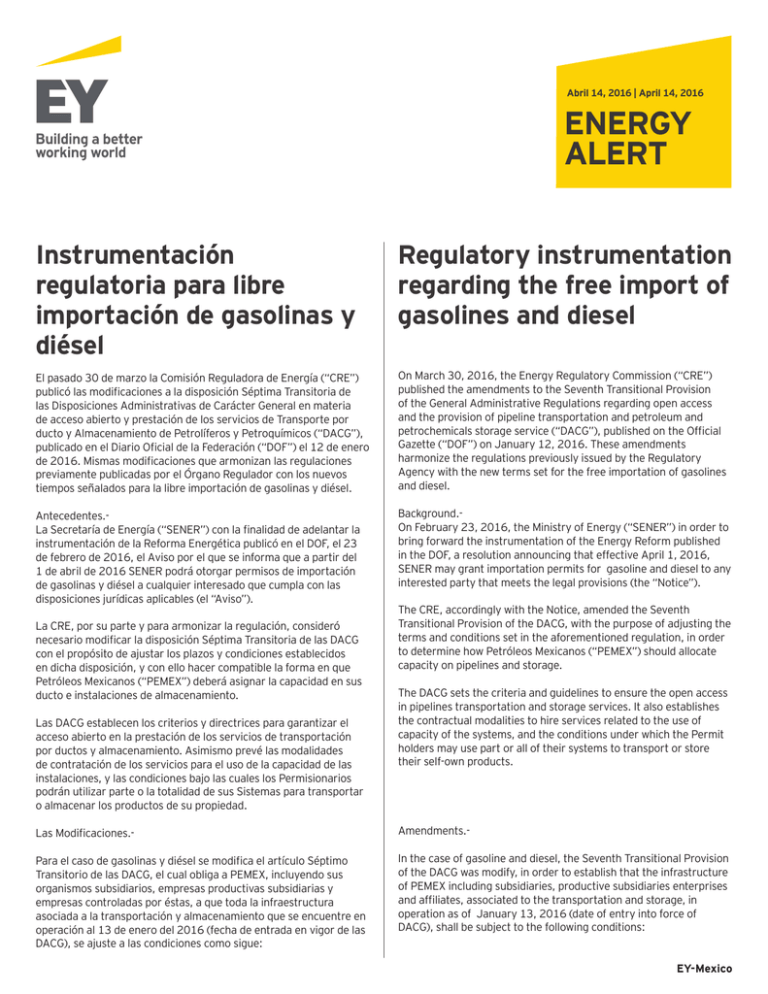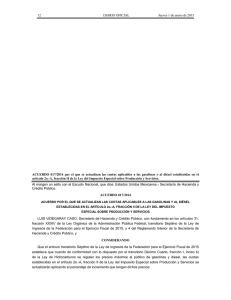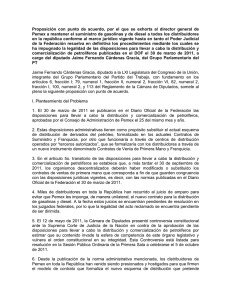Instrumentación regulatoria para libre importación de gasolinas
Anuncio

Abril 14, 2016 | April 14, 2016 ENERGY ALERT Instrumentación regulatoria para libre importación de gasolinas y diésel Regulatory instrumentation regarding the free import of gasolines and diesel El pasado 30 de marzo la Comisión Reguladora de Energía (“CRE”) publicó las modificaciones a la disposición Séptima Transitoria de las Disposiciones Administrativas de Carácter General en materia de acceso abierto y prestación de los servicios de Transporte por ducto y Almacenamiento de Petrolíferos y Petroquímicos (“DACG”), publicado en el Diario Oficial de la Federación (“DOF”) el 12 de enero de 2016. Mismas modificaciones que armonizan las regulaciones previamente publicadas por el Órgano Regulador con los nuevos tiempos señalados para la libre importación de gasolinas y diésel. On March 30, 2016, the Energy Regulatory Commission (“CRE”) published the amendments to the Seventh Transitional Provision of the General Administrative Regulations regarding open access and the provision of pipeline transportation and petroleum and petrochemicals storage service (“DACG”), published on the Official Gazette (“DOF”) on January 12, 2016. These amendments harmonize the regulations previously issued by the Regulatory Agency with the new terms set for the free importation of gasolines and diesel. Antecedentes.La Secretaría de Energía (“SENER”) con la finalidad de adelantar la instrumentación de la Reforma Energética publicó en el DOF, el 23 de febrero de 2016, el Aviso por el que se informa que a partir del 1 de abril de 2016 SENER podrá otorgar permisos de importación de gasolinas y diésel a cualquier interesado que cumpla con las disposiciones jurídicas aplicables (el “Aviso”). Background.On February 23, 2016, the Ministry of Energy (“SENER”) in order to bring forward the instrumentation of the Energy Reform published in the DOF, a resolution announcing that effective April 1, 2016, SENER may grant importation permits for gasoline and diesel to any interested party that meets the legal provisions (the “Notice”). La CRE, por su parte y para armonizar la regulación, consideró necesario modificar la disposición Séptima Transitoria de las DACG con el propósito de ajustar los plazos y condiciones establecidos en dicha disposición, y con ello hacer compatible la forma en que Petróleos Mexicanos (“PEMEX”) deberá asignar la capacidad en sus ducto e instalaciones de almacenamiento. Las DACG establecen los criterios y directrices para garantizar el acceso abierto en la prestación de los servicios de transportación por ductos y almacenamiento. Asimismo prevé las modalidades de contratación de los servicios para el uso de la capacidad de las instalaciones, y las condiciones bajo las cuales los Permisionarios podrán utilizar parte o la totalidad de sus Sistemas para transportar o almacenar los productos de su propiedad. The CRE, accordingly with the Notice, amended the Seventh Transitional Provision of the DACG, with the purpose of adjusting the terms and conditions set in the aforementioned regulation, in order to determine how Petróleos Mexicanos (“PEMEX”) should allocate capacity on pipelines and storage. The DACG sets the criteria and guidelines to ensure the open access in pipelines transportation and storage services. It also establishes the contractual modalities to hire services related to the use of capacity of the systems, and the conditions under which the Permit holders may use part or all of their systems to transport or store their self-own products. Las Modificaciones.- Amendments.- Para el caso de gasolinas y diésel se modifica el artículo Séptimo Transitorio de las DACG, el cual obliga a PEMEX, incluyendo sus organismos subsidiarios, empresas productivas subsidiarias y empresas controladas por éstas, a que toda la infraestructura asociada a la transportación y almacenamiento que se encuentre en operación al 13 de enero del 2016 (fecha de entrada en vigor de las DACG), se ajuste a las condiciones como sigue: In the case of gasoline and diesel, the Seventh Transitional Provision of the DACG was modify, in order to establish that the infrastructure of PEMEX including subsidiaries, productive subsidiaries enterprises and affiliates, associated to the transportation and storage, in operation as of January 13, 2016 (date of entry into force of DACG), shall be subject to the following conditions: EY-Mexico I. A partir del 1 de abril de 2016 y hasta el 31 de diciembre de 2019, se observarán las siguientes modalidades de servicio: I. From the date April 1, 2016 until December 31, 2019, the following operating modes shall be observed: a)Reserva Contractual, hasta por 90% de la Capacidad Operativa de los Sistemas, misma que podrá ser contratada por PEMEX o terceros, considerando que los terceros que realicen la contratación podrán seguir adquiriendo la gasolina y diésel objeto de ventas de primera mano o bien importarlos directamente. a)Contractual Reserve, up to 90% of the Operating Capacity of the Systems, which may be hired by PEMEX or third parties, considering that the third parties who execute the contracts may continue purchasing gasoline and diesel from first-hand sales or import it directly. b)La asignación de esta capacidad se determinará con base en los resultados de Temporadas Abiertas, conforme a los procedimientos establecidos en la Sección B del Apartado 2 de las DACG. La vigencia de estos contratos podrá pactarse libremente entre las partes considerando, en su caso, las condiciones establecidas en las Temporadas Abiertas. b)The allocation of this capacity is determined on the results of the Open Seasons, according to the proceeding set for in Section B, point 2 of the DACG. The effective term of the agreements may be agreed between the parties considering, where appropriate, the terms of the Open Seasons. El proceso para la celebración de la primer Temporada Abierta para la asignación de la Capacidad Disponible a que se refiere este inciso deberá dar inicio en el mes de marzo de 2016. La resolución o resoluciones por parte de la CRE sobre los términos de las Temporadas Abiertas aún se encuentran pendientes de publicación. PEMEX, en su calidad de comercializador, podrá reservar la capacidad que le sea asignada como resultado de las Temporadas Abiertas. No obstante, cuando un tercero distinto al propio PEMEX requiera capacidad para transportar o almacenar gasolinas o diésel objeto de ventas de primera mano en refinerías u otro punto de origen de producción nacional, la capacidad que requiera dicho tercero deberá ser cedida por PEMEX, en su caso, conforme a la disposición 25 (cesión entre usuarios) de las presentes DACG. En caso de no llegar a un acuerdo, la parte afectada podrá solicitar la intervención de la CRE conforme a la disposición 50 de las DACG. Ahora bien, para el caso de Petrolíferos y Petroquímicos distintos a las gasolinas automotrices y diésel, se modificaron las condiciones, quedando idénticas a las de gasolinas y diésel señaladas arriba, salvo los tiempos que permanecieron sin modificación, es decir las condiciones estarán vigentes desde del 1 de enero de 2016 y hasta el 31 de diciembre de 2019. The process for holding the first Open Season for the allocation of the available capacity referred to in this paragraph shall start in March, 2016. The resolution(s) of the CRE regarding the terms of the Open Seasons are still pending publication. PEMEX, as a marketer, is able to reserve the capacity allocated as result of the Open Seasons. However, when a third party different from PEMEX requires capacity to transport or storage gasoline and diesel being sold first-hand from a refinery or other point of origin of national production, such capacity must be transferred from PEMEX, as the case may be, in accordance with the provision 25 (transfer between users) of the DACG. In the absence of an agreement, the affected party may request the intervention of the CRE under the provision 50 of the DACG. In case of oil byproducts and petrochemicals different from gasolines and diesel, the same amendments shall apply, except for the transitory term, which suffered no changes, remaining as originally established, from January 1, 2016 to December 31, 2019. 1 The Maximum volume of Petroleum and Petrochemicals that can be handled in a Transport System to the Maximum pressure allowable or, for storage operation, the maximum volumes of Petroleum and Petrochemicals that can receive, store and deliver considering the design features and construction of the corresponding system under normal operating conditions. Contactos / Contacts 1 El volumen máximo de Petrolíferos o Petroquímicos que se puede conducir en un Sistema de Transporte a la máxima presión de operación permisible o, tratándose de Almacenamiento, los volúmenes máximos de Petrolíferos o Petroquímicos que se pueden recibir, almacenar y entregar considerando las características de diseño y construcción del Sistema correspondiente, en condiciones normales de operación. Alfredo Álvarez alfredo.alvarez@mx.ey.com 52 (55) 1101-8422 Rodrigo Ochoa rodrigo.ochoa@mx.ey.com 52 (55) 5283-1493 José Fano jose.fano@mx.ey.com 52 (55) 5283-6425 Yuri Barrueco yuri.barrueco@mx.ey.com 52 (55) 1101-8433 Koen van’ t Hek koen.van-t-hek@mx.ey.com 52 (55) 1101-6439 Santiago Llano santiago.llanozapatero@ey.com (1) 713-750-8376 Óscar López-Velarde oscar.lopezvelardeperez@ey.com 52 (55) 5283-8677 / (1) 713-750-4810 Elizabeth Ceballos elizabeth.ceballos@mx.ey.com 52 (55) 5283-1300

